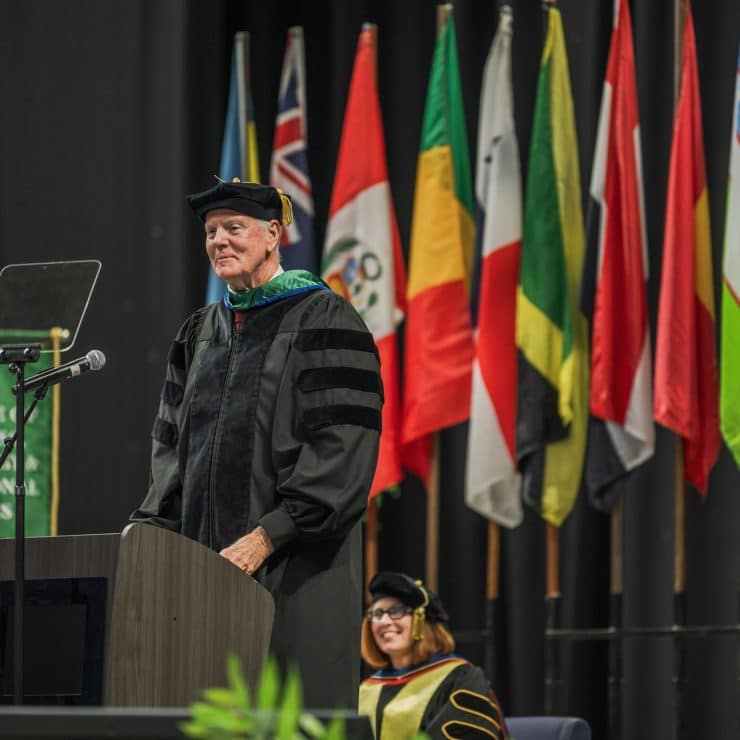
Like his father and grandfather, Franklin S. Clark III, MD has worked for decades at the forefront of economic and social enterprise in Cumberland County. As a founding board member and chair of the Methodist University Cape Fear Valley Health School of Medicine, Inc., he continues shaping the future of health care for millions of residents in Southeastern North Carolina.
Like his father and grandfather, Franklin S. Clark III, MD has worked for decades at the forefront of economic and social enterprise in Cumberland County. As a founding board member and chair of the Methodist University Cape Fear Valley Health School of Medicine, Inc., he continues shaping the future of health care for millions of residents in Southeastern North Carolina.
Clark’s grandfather, Franklin St. Clair Clark, was a chemical engineer who moved from New York to Fayetteville to work in pine stores. He became president of the Georgia Pine Turpentine, Co. and was a cofounder of the Pine Institute of America, a multistate reforestation organization in the Southeastern U.S. He also served on the board for one of Fayetteville’s first public schools, the Donaldson Military School.
Clark’s father, Franklin S. Clark Jr., was a prominent Fayetteville attorney and a co-founder of Methodist University in 1956. Clark Jr. served as the first president of the Fayetteville College Foundation, raising funds and statewide support to establish the institution.
As a thoracic surgeon, Franklin Clark III spent his medical career with a keen eye on conditions impacting patients’ hearts, lungs, esophagi, and tracheas. Clark was well known as a talented surgeon. With compassion and technical expertise, he guided thousands of patients and their families through treatment decisions, procedures, and recovery.
However, his capacity to treat patients was too often limited by a systemic issue beyond his control as a surgeon. The region’s shortage of hospital beds too often delayed important and lifesaving care for local patients.
This is why, in 1981, Clark joined a group of physicians to establish the Fayetteville Ambulatory Surgery Center – the first freestanding outpatient surgery center on the East Coast of the U.S. This new model of outpatient care met patients’ planned surgical needs (e.g., cataract surgery, hernia repair, tonsillectomies, etc.) and freed up hospital beds for intensive and acute care medical procedures.
Even with the surgery center’s successful integration into the health care ecosystem, Clark still recognized obstacles preventing his patients from getting needed care. He left medical practice in 1989 to help change the system. For the next two decades, Clark and his business partners established multiple private ventures offering health care services we now take for granted.
Cumberland County residents will likely know the facilities Clark and his associates have built, including Fayetteville’s Village Green Rehabilitation & Health Care Center, the Carolina Inn assisted living facility, and the Carolina Highlands independent living condominiums. They also founded a business for medical diagnostic services and lithotripsy (a noninvasive procedure for breaking up kidney and gall stones).
In conversation, Clark is modest about his entrepreneurial achievements; even rueful that he never took a business class (“It probably would have helped me!” he chuckles). Nevertheless, Clark has a unique ability to understand the many parts of complex systems – in medicine and in the community. While he certainly heard the cheers as a basketball star at the University of North Carolina at Chapel Hill, it is without much fanfare that Clark chooses to run his businesses as he works to connect residents to the resources that can improve their lives.
Clark’s support of Methodist University first began in 1966 when he and his siblings established the Franklin S. Clark annual scholarship in honor of their late father. He has regularly contributed to the MU Loyalty Fund for scholarships and to campus capital projects. He was a guest-lecturer for MU nursing classes on thoracic care and most recently was the keynote speaker at the 2024 Methodist University Graduate Commencement Ceremony, where he was awarded the honorary Doctorate of Humane Letters degree in recognition of his many contributions to the wellbeing of his community.
Clark’s record of support spans the Fayetteville’s ServiceSource Foundation, the Friendship House, Cumberland Community Foundation board, the chamber of commerce, the home builders’ association board, the Care Clinic, Sandhills Area Land Trust, Fayetteville Animal Protection Society, Cape Fear Botanical Gardens, and Cape Fear Valley Health Foundation, among others.
With his achievements in business and medicine, Clark could comfortably retire to the mountains or to the beach, but his constant love for his hometown keeps him close and engaged in community health concerns.
“I’ve always thought that Methodist University is doing a great job with the Physician Assistant, Physical Therapy, and Occupational Therapy programs,” Clark said. “The medical school is a great next step for health care in the entire region. Care will be better and more available to more people.”
The new school of medicine is already benefitting from Clark’s generosity, vision, and determination. He is joined on the medical school’s board by other visionaries, including Brett Johnson, Lucy Jones, Alicia Marks Flowers, Gen. Dan McNeill (Ret.), Tammy Thurman, Walter Tippett, Cape Fear Valley Health CEO Mike Nagowski, and MU President Stanley T. Wearden.
“Dr. Clark’s knowledge of the health care industry and his entrepreneurial experience in the region are invaluable gifts to Methodist University,” Wearden said. “His wisdom and commitment to this community are unsurpassed. He is a highly successful man in multiple endeavors who made the decision to work and live in his hometown in an effort to make Fayetteville and Cumberland County a better and healthier place. Dr. Clark is a genuinely humble and self-effacing man who has spent his adult lifetime working quietly, behind the scenes on transformative initiatives that are leaving this community forever changed for the better.”